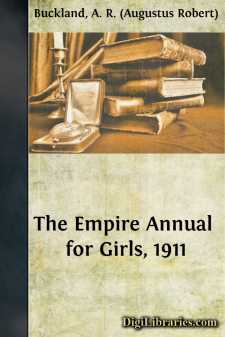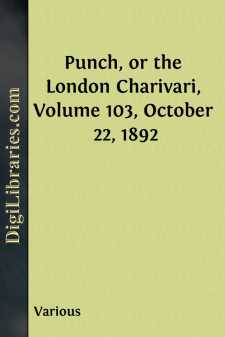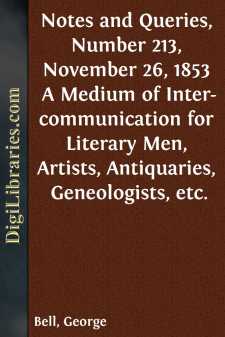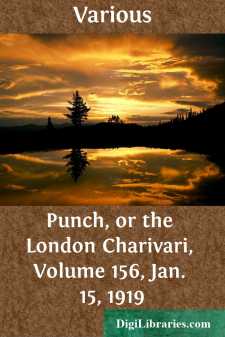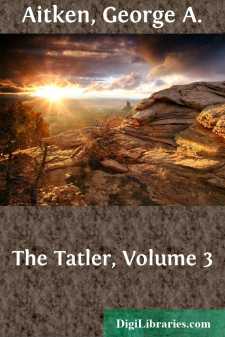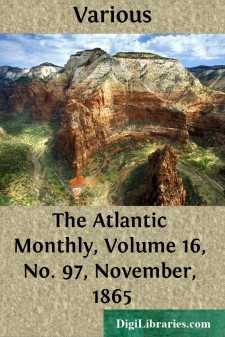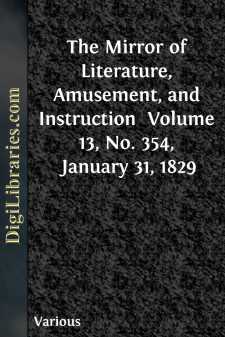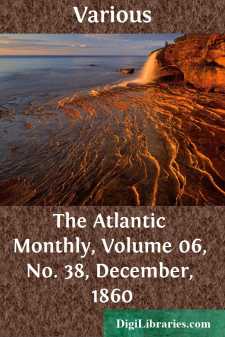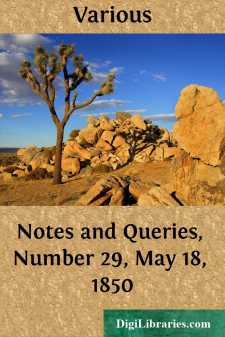Periodicals
- Art 27
- Children's periodicals 59
- Entertainment 5
- Food/Wine 2
- Games/Humor 455
- General 661
- Health 1
- History 53
- House/Home 1
- Regional 62
- Science/Nature 118
- Transportation 10
Periodicals Books
Sort by:
The Christmas ChildBYMrs. G. de Horne VaizeyA happy thought, a cross-country journey, a strange discovery, another happy thought, and many still happier thoughts hereafter!Jack said: "Nonsense! We are all grown up now. Let Christmas alone. Take no notice of it; treat it as if it were an ordinary day." Margaret said: "The servants have all begged for leave. Most of their mothers are dying,...
more...
by:
Various
SWORD AND PEN; Or, The Rival Commanders. (Extract from a Military Story of the near Future.) Captain Pipeclay was perplexed when his Company refused to obey him. He was considered a fairly good soldier, but not up to date. He might know his drill, he might have read his Queen's Regulations, but he had vague ideas of the power of the Press. "You see, Sir," remonstrated his Colour-Sergeant;...
more...
by:
George Bell
THE STATE PRISON IN THE TOWER. A paragraph has lately gone the round of the newspapers, in which, after mentioning the alterations recently made in the Beauchamp Tower and the opening of its "written walls" to public inspection, it is stated that this Tower was formerly the place of confinement for state prisoners, and that "Sir William Wallace and Queen Anne Boleyn" were amongst its...
more...
by:
Various
FARCOT'S SIX HORSE POWER STEAM ENGINE. This horizontal steam engine, recently constructed by Mr. E. D. Farcot for actuating a Cance dynamo-electric machine, consists of a cast iron bed frame, A, upon which are mounted all the parts. The two jacketed, cylinders, B and C, of different diameters, each contains a simple-acting piston. The two pistons are connected by one rod in common, which is fixed...
more...
by:
George A. Aitken
My Lord, After having long celebrated the superior graces and excellences among men, in an imaginary character, I do myself the honour to show my veneration for transcendent merit, under my own name, in this address to your lordship. The just application of those high accomplishments of which you are master, has been an advantage to all your fellow subjects; and it is from the common obligation you...
more...
by:
Various
WHY THE PUTKAMMER CASTLE WAS DESTROYED. There is a test of truth in popular creeds and in human opinions generally which is prominently put forward by Herbert Spencer, and has been more or less distinctly stated by other writers, long before our time,—a very searching and trustworthy test. It is, in substance, this:—Whatever doctrine or opinion has received, throughout a long succession of...
more...
by:
Various
THE COLOSSEUM, IN THE REGENT'S PARK. In a recent Number of the MIRROR we offered ourselves as the reader's cicerone throughout the interior of this stupendous building, the exterior of which is represented in the annexed engraving; and the architectural pretensions of which will, we trust, be found of equal interest to the interior. The Colosseum is what is termed a polygon of sixteen sides,...
more...
by:
Various
I. O Love! the flowers are blowing in park and field, With love their bursting hearts are all revealed. So come to me, and all thy fragrance yield! O Love! the sun is sinking in the west, And sequent stars all sentinel his rest. So sleep, while angels watch, upon my breast! O Love! the flooded moon is at its height, And trances sea and...
more...
by:
Various
OLIVER CROMWELL AS A FEOFFEE OF PARSON'S CHARITY, ELY There is in Ely, where Cromwell for some years resided, an extensive charity known as Parson's Charity, of which he was a feoffee or governor. The following paper, which was submitted to Mr. Carlyle for the second or third edition of his work, contains all the references to the great Protector which are to be found in the papers now in the...
more...


